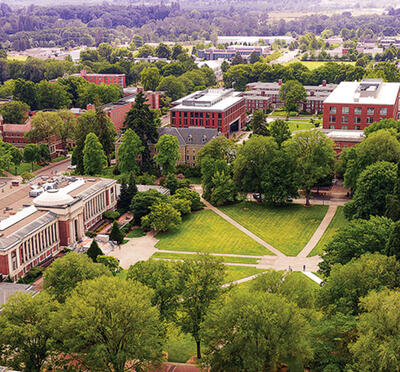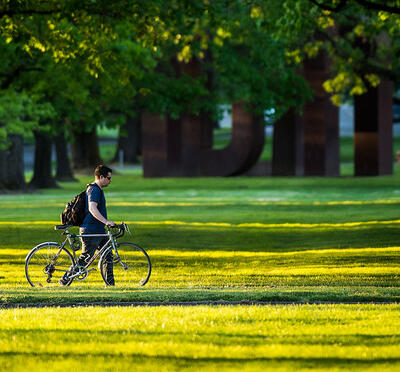Bill Reed awoke to a phone ringing at 3 a.m. on April 22. This was not unusual.
He gets calls like this about once a week, asking if he and his dog can track the scent of a missing person. Reed (’75 B.S., Electrical and Computer Engineering) is part of the California Rescue Dog Association, a search and rescue organization that deploys teams throughout the state.
This mission was a little farther away than usual for the Oregon State University alumnus. It was in Santa Barbara, a four-hour car ride from his home in San Jose. Fortunately, Reed is also a pilot. So, he and his aptly named dog, Scout, hopped in his small brush plane and were there in an hour and a half.
Entering the missing person’s house to retrieve an article with their scent required additional precautions because of the COVID-19 pandemic. This time, Reed wore a disposable clean-room suit. But surgical gloves and tongs are standard, so Reed does not contaminate items with his own scent.
Reed and his dog quickly located the person, who has dementia and had wandered away from home. Other missions have not been so easy. Reed and another rescuer spent three days in the remote rugged land near Lake Tahoe, searching for someone they never found.
“We were dropped by helicopter and had to be self-sufficient the entire time,” he said. “The hard part was the 100 degree heat and 7,500 feet elevation, and having to carry all of our water.”
Reed’s spirit for adventure and desire to make a difference in the world have guided his career and life.
His interest in electrical and computer engineering started when his dad would bring him to work at Channel 12 in Portland, where Reed would help fix equipment. He also learned ham radio growing up. At Oregon State, he worked for KBVR as the chief engineer for the TV and FM radio station, which broadcast Oregon State’s sports games and helped create instructional videos.
The camaraderie of fellow students at KBVR and the varsity judo team, where he met his wife, are a lasting memory. The relationships he built there have had an impact on his career through referrals and recommendations.
As a junior, Reed had a summer internship with Bechtel, a world leader in construction megaprojects like the Hoover Dam, the Trans-Arabian Pipeline, and the Bay Area Rapid Transit system.
“When I graduated, I walked right into a career with Bechtel and got sent everywhere on a variety of projects,” Reed said.
He worked as a field engineer, managing an electrical team on industrial construction projects. One of the most memorable was in a secluded spot near Fort McMurray, Canada, where the Syncrude refinery was being built.
“There were no roads, so we had to fly in,” Reed said. “It was just a big production camp with construction trailers and a giant mess hall. Then, every six weeks we’d get R&R and go back to civilization. So yeah, that was real different.”
Despite his taste for adventure, Reed realized living like that might get old after a while and settled down in Silicon Valley to move into high-tech. He worked for Ampex for several years in the area of magnetic recording, then switched to working for Seagate on disc drive technology before he retired.
Retirement didn’t suit him though.
“I got bored,” Reed said. “And an opportunity just fell out of the sky. It was exciting enough to get me to come out of retirement.”
Reed is currently the CTO of eIQ Energy Inc., which hopes to revolutionize the way power grids operate. The company is working with utility companies to integrate microgrid solar systems as part of the grid network.
“Imagine a community where you have your own little power station and so do all your neighbors. You are all sharing power,” he said. “Say you go away for the weekend; you can dial back your electricity and sell that to your neighbor. Maybe they’re having a big wedding party and need to buy extra power.”
The motivation for incorporating microgrids is to improve electric grid flexibility and resilience and help prevent catastrophic power outages. Researchers at Oregon State are working on the same problem and have reached out to Reed to collaborate on future projects.
Reed sees it as an opportunity to change the world, but also a return to adventure.
“It’s just like when I started out,” he said. “I got out of field work, and here I am now in the middle of the desert in New Mexico putting up solar panels.”



